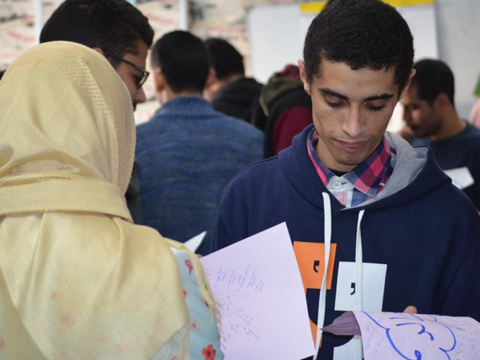Workshops on dialogue are becoming popular among medical students at Mansoura University. The Ambassadors for Dialogue Egypt and the International Federation for Medical Students are collaborating on training future doctors in the culture of dialogue.
By Ahmed Bazzoum and Martha Flyvholm Tode
“There is no doubt that healthcare providers should be able to dialogue.” Medical student Sama El-Eraky is certain: Dialogical skills are as important for nowadays’ doctors as knowledge of anatomy and the ability to diagnose correctly, and receiving training in dialogue should therefor be mandatory for future doctors. “Also, dialogue is a key to equal healthcare, as it builds understanding and facilitates setting aside potential economic, cultural, and ideological differences between doctor and patient.”

Working to become certified dialogue instructors
Sama El-Eraky is in her sixth year and is also volunteering as instructor of the International Federation for Medical Students (IFMSA). Providing a safe space for future physicians to develop and reach their full potential, IFMSA is a medical student organization, offering training sessions in soft skills on a local, national, and international level.
In 2011, the Ambassadors for Dialogue Egypt (AFD) introduced the organization to the culture of dialogue. Since then, AFD has been facilitating various trainings, workshops and dialogue circles on relevant topics linked to the medical field. Being aware of the responsibilities awaiting them, the medical students see it as an opportunity to discuss and explore solutions to difficult situations they might have to face in the future.
“I attended a session with the Ambassadors for Dialogue on ‘medical ethics,” Sama continues. “The session was incredibly useful because we were able to explore the difficult aspects of medical ethics with ease, and people were able to express their views and thoughts without any judgements.”
“In our society, we are always quick to pick sides, and attack anyone who is opposing our ideas. This creates a toxic environment where people find it hard to trust each other,” Sama elaborates. “Dialogue is important as it is a safe way to promote peace, coexistence, and mutual understanding.”

Exploring medical ethics
Indeed, the focus on the doctor’s human qualities such as empathy and ability to communicate, explain, collaborate and show understanding, has been increasing lately. In Denmark, personality tests were considered to be made an obligatory part of the qualifying examinations of the enrolment at the faculty of medicine. Also, the modern version of the Hippocratic Oath – an ethical oath that physicians by tradition have to take when becoming a doctor – states that the doctor knows that “warmth, sympathy, and understanding may outweigh the surgeon’s knife or the chemist’s drug”.
Akram el-Shamy, a fourth-year medical student from Mansoura University and IFMSA instructor, explains: “As physicians of the future, we must understand the importance of dialogue. It is the way to build a professional doctor-patient relation of trust and respect. Especially as physicians we have to accept our patients, as a minimum out of respect towards their families, who are also affected by the situation. Through dialogue we can show understanding and often, this creates the confidence needed between doctor and patient.”
As a certified IFMSA instructor Akram is responsible for arranging awareness campaigns for patients’ rights. He is organizing workshops on medical-related topics, using alternative training methods like role-play, simulation and experience sharing. Yet, he is still participating in the trainings facilitated by the AFD, as he sees it as an opportunity to keep learning and developing.
“I have been trained by the Ambassadors for Dialogue more than once, and participated in their trainings of facilitators, dialogue workshops and dialogue circles. They are good at creating a space for discussion and listening, and I use them as an inspiration, when I am training others.”
In Mansoura an impressive amount of the medical students has shown interest in the IFMSA-AFD dialogue trainings. This has led to the creation of an intensive training program of certified dialogue instructors, ready to train the future doctors in dialogue.
Martha Flyvholm Tode & Ahmed Bazzoum work at DEDI.
Read more about the Ambassadors for dialogues other projects HERE
Learn more about the students organization IMFSA Egypt HERE
Quote:
“As physicians of the future, we must understand the importance of dialogue”







